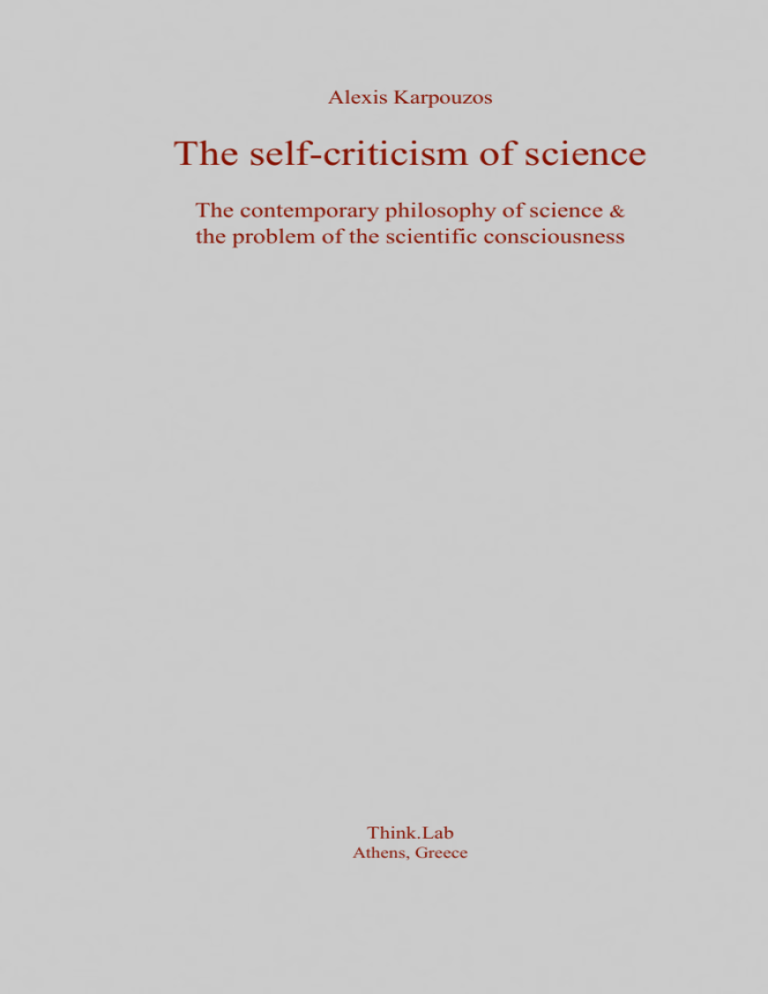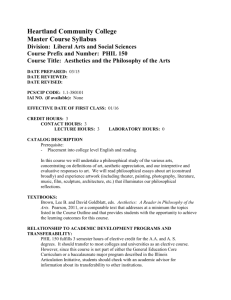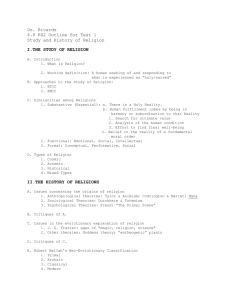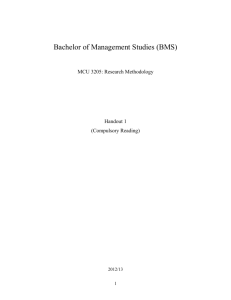The contemporary philosophy of scienc
advertisement

Alexis Karpouzos The self-criticism of science The contemporary philosophy of science & the problem of the scientific consciousness Think.Lab Athens, Greece Alexis Karpouzos The self-criticism of science - the contemporary philosophy of science and the problem of the scientific consciousness Translation & editing: Haris Lambrou Published by Think.Lab, Athens, Greece 2013 ergastirio-skepsis.tumblr.com Alexis Karpouzos Alexis Karpouzos is a writer. In the last 15 years, he has created Think.Lab, an open space-time of thought and action that aspires to create an different experience in education and culture. In the self-organised Think.Lab, a number of workshops are running. Workshops of apprenticeship and reflection in which the members are educated in various cognitive objects, such as philosophy, theoretical linguistics, theory of literature, social and political sciences, theoretical physics, logic and mathematics, formative and visual arts. Publications - Introduction to philosophy of Understanding, The adventure of human emancipation, Free Press - The Philosophy of Nature, Free Press - The languages of the world, The worlds of language, Think.Lab - Thought and language into the ancient greeks times, Think.Lab Upcoming publications - Time and Thought - From the poetic thinking of pre-socratic philosophers to the absolute spirit of Hegel - Technique and Time Links anoixtiskepsi.blogspot.com openthought.blogspot.com The essays that follow are taken from a series of lectures given by the author, in autumn of 2012 in Athens. Contents Scientism 1 Physiocracy of phenomenocracy 5 Empiricism 8 Objectivity of value indifference 10 Instrumentalist knowledge 12 The epistemologically problems of the contemporary scientific knowledge 14 Beyond the metaphysics antithesis of technic & art 19 The contemporary philosophy of science (epistemology) featuring K.Popper, T.Kuhn, I.Lakatos, P.Feyerabend, Hanson among others, has exercised a decisive critique to the dominant views of the positivist and neo-positivist model of knowledge and has in fact undermined its credibility. The most important attacks on positivism are focusing on its fundamental tenets presented below: Scientism Scientism, or the unity of scientific method. The positivist methodology does not see any difference between the natural and the social sciences. The adoption however, of the unity of the scientific method is accepted in tandem with the notion of the predominant role of the natural sciences, in which the social sciences see their model. The outcome is what we call scientism, that is the view that only the natural sciences can produce the semantic interpretation of knowledge. In the following commentary we will schematically present the criticisms that have been addressed to the positivist and naturalistic knowledge paradigm. All the thinkers and all the currents of social theory that are opposed to positivism, converge to the following point: The method of natural sciences cannot be transported to the social sciences; and this because the object of study of social sciences is a pre-interpreted world of events, that is a social world in which the categories of experience have already been formulated by and through the context of noematic–semantic behavior of the human subjects and the communicative exchanges and interac- 1 tions that are taking place. The social scientist is not a mere observer of natural events but participates as an active social subject in the symbolic-semantic systems that she/he examines. The necessary implication is that she cannot study the social events ‘from the outside’, as if the latter were mere ‘objects’. The purpose of her study is to interpret and understand the justifications, the expectations and the multitude of ways through which human subjects go by in their social interactions and also how this experience affects them. The social scientist can understand human subjects because he is part of the social world and is also the ‘subject’ of his study. In this way, his hermeneutic endeavor cannot attain an ideological or evaluative neutrality. The aim of the social scientist is not to search for laws that govern human behavior or the social world, but the understanding of its significance and the discovery of the social and psychological preconditions that contributed to the character of the former. Historical and social phenomena are unique and unrepeatable, are related to values and aims, while natural phenomena are connected with relations of causation. As a consequence, the social scientist cannot articulate laws and proceed to projections. The intention of positivist sociology to discover social ‘laws’ turns sociology into social technology. Relevant to the issue at hand, the phenomenological hermeneutics of Hans Georg Gadamer and Martin Heidegger, introduced the notion of understanding as the ontological precondition of the human society. Under- 2 standing predates the cognitive process of the subject and it is in this sense that the distinction between natural and social sciences disappears. Understanding forms the archetypical existential condition of being and is connected to the potentiality of being, as a temporality, which is the structural element of human existence. From this point of view, the meaning of the phrase ‘the Being-in-itself is time’ is that the nature of human existence lies in its historicity and temporality is literally ‘in the world’. The historicity of the life-world is the a priori condition that makes knowledge and selfconscience possible. Through the hermeneutic process, understanding emerges as the specific manner in which the historicity of nature takes its form. The ideal of objective knowledge, of impartiality and precision as targets of the modernistic thought and their connection to the method of the natural sciences, is rejected and refuted. Any cognitive operation is par excellence a hermeneutic activity. The interpreter is predispossessed inside the historic life-world that substantiated his existence. And even if we try to forge the natural vs the social sciences distinction as a division of methods and tools, the hermeneutic experience cannot be separated from the methodological scrutiny. As a result of all this, the ideal of an a-historic, objective and universal truth is being seriously challenged, while the historical nature of knowledge and interpretation come to the fore. The phenomenological hermeneutics of Heidegger and Gadamer lies in parallel to the newer developments in the philosophy of science. Roy Bashkar, ‘things exist and act independently of our descriptions, but we are capable to know them only through the specific descrip- 3 tions. Descriptions exist in the world of human society, objects in the world of nature. We express our own understanding of nature and thought.’ 4 Physiocracy of phenomenocracy For positivism, the object of scientific method is an external reality and science is signified from the observable natural phenomena. This view entails on one hand physiocracy, that is the recognition of the physio-empirical origin of knowledge and on the other hand physiocracy or objectivism, that is, the acceptance of an objective and self-sustainable existence of phenomena. The answer to the previous arguments is constructed by the position known as underdetermination of theory from empirical indications and the theoretical weighting of the action of observation. Both these critical challenges to positivism were born out of the context of conventionalism, which historically has set the first main point of opposition to positivism (or rather, to reductionism). The basic epistemological tenet of conventionalism holds that the laws of science (such as Newtonian mechanics) and the axioms of mathematics (like Euclidian geometry) are not experimental generalizations, neither a priori knowledge but conventions or linguistic definitions. The French philosopher of science, Henri Poincare, is considered the main proponent of conventionalism. The position of under-determination rejects the possibility of a solely empirical determination of theory, i.e. the possibility for a theoretical schema that lies in absolute agreement with experience. The justification of the underdetermination thesis is founded on some arguments developed by Duhem and Quine and due to this it is also known as the Duhem-Quine thesis (despite that the independent views of Duhem and Quine do not always coincide). 5 We now come to the thesis of theory-ladenness of obseration, which also initially was put forward by Duhem. Duhem has distinctively stated the central point of this thesis in the title of a chapter of his book as ‘An Experiment in Physics is not simply the observation of a phenomenon; it is besides, the theoretical interpretation of this phenomenon.’ Later on, the thesis was adopted and developed by Kuhn, Feyerabed, Bohm, Hanson, Tulmin. The theory-ladenness of observation, is usually understood as a two-fold concept: a) That observations include an accompanying set of hypotheses, which appear in the form of theory of measurement, psychology of observation, linguistic orderings etc. b) In the sense that what is regarded as a relative and precise empirical indication is based partly on the theoretical paradigm to which the empirical indication itself comes to examine. The first concept corresponds to the thesis of underdetermination of theory. A consequence of the theory- ladenness of observation is that scientists can in principle be suspicious of a certain observation and challenge the validity of its constituent hypotheses. The second concept of they theory-ladenness of observation has some interesting consequences on the role of observation in the choice of theory. It is an obvious fact, according to this concept, that observations cannot function as objective referees in the choice of theory, when at the same time, the importance and the character of the former, and 6 their own estimating and measuring ability is dependent upon competitive theories. It is precisely in this way that theory-laden observations can lead to opposing conclusions (in the sense of Kuhn). In addition to that, even if the supporters of different theories agree to the importance of a crucial experiment, the evident assumption would be that the different theoretical priorities of scientists would differentiate the nature of their own estimation and also the mediums used to reach this estimation. We therefore see that the thesis of the theory-ladenness of observations creates the preconditions for the existence of different scientific priorities. And it is within the intentions of social studies of science, the sociological analysis of these differences in the framework of certain scientific practices. 7 Empiricism On the basis of positivist epistemology lays the empirical observation (verification criteria), which takes shape with the experimental method. The self-obvious recognition of the positive character of experience as the exclusive criterion of truth is the characteristic feature of positivism, throughout all the forms of Greek and Western philosophical tradition. Karl Popper, in the 1930’s, went against the positivist ratification and rejected the inductive method. To find a way out of the dead-end of inductivism, Popper presented an alternative method of inference, which replaces the principle of verification with the principle of falsification. The epistemological method of Popper, based on conjectures and formulations, is also known as falsificationism, or method of trial-anderror. In this method, science does not start from observations in order to proceed through the way of inductive inferences, according to the inductivist position. By contrast to the positivist view, it starts from certain conjectural hypotheses, which are being put to the test of empirical testing and scientists try to reformulate them, keeping a critical stance in the process and experimenting with alternative hypotheses. So, in place of the inductive method, Popper proposes the deductive reasoning (from the general to the specific) through the process of falsification (refutation) of a hypothesis (or a conjecture). A scientific theory which survives after a substantial amount of critical examinations and empirical tests can be accepted on a temporary basis and not permanently, until the time comes of some future test that will overthrow it. In other words, for Popper no theory is verifia- 8 ble, it may only have a high degree of empirical strength, which implies that all scientific theories are in principle falsifiable. Added to that, there are many theories that continue to be accepted despite the fact that their validity has already been seriously challenged. Newtonian mechanics was an example of such theories. Newton’s theory had an extraordinary agreement with observation and experiment at the time of its appearance (1687) until 1900. But in the first twenty years of the 20th century, its validity was challenged from the new viewpoint of relativist mechanics, without however been abandoned. A similar situation exists for the Euclidean geometry which is considered to be valid for the Earth but no so in the Universe. 9 Objectivity of value indifference Science as viewed by positivism, should not engage in any value judgments of it object of study. It is an objective activity void of any social or moral value. Its mission is to focus only on empirical facts, from which as the positivists believe, no values can be produced. Also, the search for objective truth works with the sole purpose of empirical verification, independently of morality and self-conscience. The genealogy of the above argument traces back to the English empiricism of Hume and to the facts/values distinction that he introduced to the debate on knowledge. The absolute division between facts and values had close affinity to the realist theorization of the external view ‘from the side of God’. The totality of the Greek and Western metaphysical tradition was founded on the firm belief that the mind mirrors an independent external world; as well as that knowledge claims (judgments) are grounded in the world and that the objectivity of judgments is understood from the prism of eternity. In the contemporary thought however, mind does not represent passively an independent, static and conceptually determined world; the function of mind is that of an active intervention, transforming this ‘world’ and by this action mind transforms also itself in a continuous interrelation. The world ‘is’ inherently uncertain and undefined and allows for an unlimited number of definitions. Knowledge claims are weaved within the context of a ‘life-world’ of human subjects in a given historical period. So, knowledge claims have a historic and temporal character and in this way the conception of the world viewed under the prism of eternity, is challenged. The view of the absolute theorization of the 10 world and the epistemological claim of universal truth is being further deconstructed by the developments in modern physics, which admits that any theory is perspective. We see from this analysis that the traditional foundationalism and the reduction to concrete convictions have been seriously undermined. What is acknowledged is that the intentional activity of consciousness is uniform and socially and historically determined and so the ‘facts vs values’ distinction becomes a logical distinction rather than a generic or causal one. To put it another way, it is the analytic rather than the ontological character of this distinction that has any importance for us today. Essentially, it is the end of the metaphysical and idealist division between ‘Being’ and ethics in the sphere of ontology (in which, ‘Being’ was autonomous to the subject); the division is maintained however, as a methodological principle of philosophical and scientific thought. 11 Instrumentalist knowledge The empirical weighting of theory according to positivism, leads automatically to an instrumental conception of science. Science, in this way is understood as a useful toolbox that can be applied equally well to a variety of cases. The emphasis on the instrumental and hence neutral role of science conceals a politically conservative and anachronistic position, which stands for the superiority of science in regards to other forms of knowledge and legitimizes the recycling to a dominant position of professional and institutional organs of specialists of science, propelling in the process the ideology of the ruling class and its own interests. The instrumentalist view of science is founded on the ideological investment of mature rationalism, which aims at the achievement of targets and at an increase of power, within the framework of a bourgeois culture and its mechanism of capitalist management, and not at the creation of values that would seek the enlargement of human solidarity, of inter-subjective conscience and mutual understanding. But even, which is the objective criteria with which we shall evaluate the supremacy of scientific knowledge against the other forms of knowledge? Whatever criterion we might use, it will itself be critically dependent on the knowledge claims that give meaning to it; as of this, there are no objective and value-neutral criteria for evaluating any form of knowledge. Any attempt at defending the supremacy of a certain form of knowledge is masking the will to power and authority. The diversification of forms of knowledge and the language forms that designate them, is not of an ontological nature, but of an analytic one; and this is said upon, because all forms of 12 knowledge and the specific types of language that typify them are symbolic constructions-classifications and not objective facts of the natural world. Any form of knowledge and language amounts to a distinct way of examining the world and has its own self-referential structure, its own internal logic. The criteria of diversification are the purpose that these forms are aiming to achieve and the means they go by in doing that. Additionally, a point worth stressing is that the predominance of the scientific model results in the downgrade to the level of non-truth of all other possible ways of knowledge, except the ones that are in agreement with the method of science. Method is the intellectual and experimental convention that a subject applies to a certain object, thus producing an outcome that is valued as being true. Aesthetic conscience and art for instance, have the freedom of not being classified under a status of true-or-false, and so their ensuing judgments cannot be refuted or repudiated. These judgments however, are binding for the persons that participate in their lifeworld, and more importantly, these judgments do not carry any intentionality. In art, the subject is shaping the object and retrospectively is being shaped by the object. In this way, the sense of relation is a constructive element of the ontology of art and aesthetics, but also, of the modern ontology of science. 13 The epistemologically problems of the contemporary scientific knowledge The Copernican revolution introduced in philosophy by Kant proposes the accumulative development of knowledge, the view that human knowledge develops and progresses in a linear fashion. The critique that has been addressed to this position on the other hand, sees any philosophical and scientific revolution as merely another form of knowledge, not necessarily of a higher nature. The philosophical arguments that have been put forward to defend the above claim, have formulated the relativistic theorisation of knowledge and can be summarised as follows: i) Experience and the observational data, as well as the experimental outcome is theory laden. ii) The asymmetry of scientific theories. The objective comparison between two theories presupposes the existence of the linguistic medium in which their propositions are being set forth. The development of language however, incurs corresponding changes to the language used to enunciate the scientific theories, resulting to the asymmetry between the languages used by scientists in different historic periods. So, some propositions of an antecedent language are impossible to formulate in accordance to the terms and conditions of a posterior language and in this sense it is impossible to characterise them a posteriori as true or false. iii) The position of under-determination of theory, i.e. the position that observational data and the empirical observation in general, do not unilaterally determine one 14 and only scientific theory. There are many theories (potentially infinite) that are compatible with finite amount of data. This is a phenomenon that we may often come across in scientific practice. iv) The Duhem-Quine position, according to which, observation and experiment control a set of hypotheses and theories but never an isolated hypothesis. When the experimental outcomes are in contradiction to the set of original hypotheses that frame this outcome, we know that one or more of them is false. We cannot know however which one exactly. In this case we may alter some of these hypotheses with a view to re-establish the accordance between observation and theory. This gives us the possibility to keep a hypothesis that at first sight seems to be falsified by observation and experiment. The relativist theorisation of philosophy of science problematized and called into question the belief that the comparative evaluation of scientific theories is governed by objective criteria, and also highlighted the importance of the non-rational forces in play at the “construction” of a scientific theory. Allowing for the subjective, casual and accidental element at the formulation of a scientific theory does not lead to a rejection of the notion of scientific rationality; it nevertheless mitigates the extreme rational belief for a linear progress of science that leads to the one and only Truth, the establishing of a unique theory that would represent the ‘view from nowhere’ (Thomas Nagel). But also the extreme relativist conviction in favour of the lack of progress can be empirically refuted by the fact that the scientific theories and the rational processes that create them, lead to verifiable projections. The effectiveness of scientific theories is wide- 15 ly noticeable through their technological applications, which lead to the transformation of nature. If the efficacy of scientific theories would not be reached also by the use of rational methods we would surely be talking about an inexplicable miracle. As we see in the previous discussion, the history and the philosophy of science are characterised by refutation at the same length as by affirmation: oppositely to the position that there exist inter-subjective and eternal criteria/values which govern the scientific activity, lies the thesis which supports the contemporaneous, local and subjective expression of all those criteria. The rationality of the scientific thought that justifies the incessant development of scientific progress, is confronted with the non-rational and contingent element, subscribing to the discontinuity and the anti-evolution of scientific progress. The above mentioned antitheses become meaningful within the framework of the formal and dogmatic core of Reason (of a metaphysical origin), which confronts the rational with the non-rational element of human cognition, necessity against randomness, the unexpected and intercalary element. The ontologymetaphysics established by the current philosophy of nature is relational (uniform and differential) and in this sense the previously mentioned antitheses are renounced: Necessity and continuity, randomness and discontinuity, causality and normality, indeterminacy and contingency, topicality and universality, synchronicity and diachroneity, are all complementary to each other and are brought together in an open unity, spirally unfolding from the pan-chronicity of the World. Moreover, the critique that has emerged within the context of the 16 relational conviction on knowledge, has re-established and ratified the non-rational dimension of cognition, as a formative agent for the scientific discovery. Imagination, intuition, instinct, the empathic understanding of experience, or the psychological element together with the rational, exceed the Platonic and Cartesian metaphysics of body and mind, and highlight the uniform and differential operation of thought: corporeality, emotions and sensations, intuitions and insights, the imaginative abilities, the rational and reflective power, the personal undergoing of experience and the trials of practice, all constitute the It, what is the radical imaginative, what constitutes the condition of existence and the precondition for human activity. Τhe above critical presentation entails the revocation of humanistic belief that characterises the thought of Hegel and Kant, i.e. the conviction that the epistemic and epistemological progress would also bring social and historic progress. In modern thinkers, the conviction to the evolutional and progressive nature of knowledge, as well as the reliance on the incessant moral improvement of humanity, are being strongly opposed and rejected. Surely the convictions of the humanistic tradition, related to the evolutionary and linear nature of knowledge, are founded on the Newtonian deterministic physics, which proclaimed the linear and unambiguous concept of time. The conviction to the evolutionary and progressive nature of scientific knowledge was nurturing the hope for the socio-historic progress and the emancipation of man from psychological and social bondage, as they had been shaped within the framework of the mythical-religious image of the world, but also the release from the con- 17 straints of nature. The myth-deconstructing and demystifying effect of scientific speech, the rational interpretation, organisation and rearrangement of natural world, a world that allows for an infinite and inexhaustible determination, brought about the break with the primeval relation of man with nature and relinquished the immediateness and naturalism of life. 18 Beyond the metaphysics antithesis of technic & art The neoteric human being is now being cut off from the order of nature and establishes itself as the rationally reflecting and acting subject which is now posited against the object of its cognitive and practical activity. Civilization is constituted as the product of human activity, as an artifact and technical construct. With this development, human civilization is transformed to a ‘quasi nature’, aiming to correct and replace nature, and man assumes the nature of a technical existence. By ‘technical existence’ we mean the prevalence of a onedimensional image of the human person as the producer of rational hypotheses and interpretations and the downgrading and degradation of the non-rational element of human existence, i.e. the radical imagination as a creative capacity, which forms the a priori condition and prerequisite for social activity. This constitutive element of the modern world (man, as the producer of rational hypotheses) and its articulation with the ideology of techno-scientific progress and the evolution of the machine that transforms the methods and theories of natural sciences, arming these with new tools and constantly renovating their research and experimental capabilities, finally led to the replacement of religious and metaphysical dogmas by the blind faith to the dogma of technical and scientific progress. The prevalence of a mechanistic, materialist and deterministic view of the world, the introduction of calculation, measurement and precision as the methodological principles of science, armed with the postulation of quantitatively defined entities, has formed an equally characteristic social ethics. The abstract schemata, the 19 formalist methods, the universal ideas and concepts have subjected everything under the identional logic of the autonomous subjective Reason and to its now fundamental predicate, the intellectualist will for power. The result of this process was to underestimate or to ignore the relation and the difference between the concept and the object, between Reason and Nature, sameness and otherness, subject and object, universal and the particular. With this manner however, the variety of qualities of any species is eliminated, the distinctive singularity of the otherness is rejected, the immediate and the everlasting, non-identifiable element, is thrown in disregard. In summary, anything that could not be represented and signified within intellect’s dimension of formal logic, and this latter’s characteristic repetitiveness, was deemed as non-existent, that which is the ‘strictly psycho-spiritual’, the extraordinary, the unique, unrepeatable element that differentiates human beings, civilizations and entities and gives purpose and meaning to their existence. Certainly, the metaphysical and idealist distinction between the ‘formal-logical’ and the ‘strictly psycho-spiritual’ falls in the wider Western metaphysical-idealist tradition that discerns the material from the spiritual, the rationalistic from the temperamental, technique from art, Theory from Praxis, the collective from the individual. This distinction results from the greekwestern thought and its positive element, which presupposed that Being is ontologically defined, is governed by an immanent rationality; that it is full in meaning and allows for a thorough verification and determination from the human mind, itself having the analogous characteristics. 20 From this it is suggested that the world, as it is explained within the context of natural philosophy, is not determined as it was viewed throughout the greek-western metaphysical tradition and the technique as a totally rational activity is not able to acquire a profound knowledge of its ‘subject’. In contrary, the world ‘is’ chaos or abyss, radically undetermined and inexhaustible, creating ways to bestow meaning to life from zero. 21







